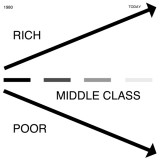If a healthy biological ecology provides for the well-being of its plants and animals, then a healthy human ecology should provide for the well-being of its constituent members. But human societies are not inclined to be healthy. And a major problem is the inequitable distribution of wealth.
In most parts of the world during the last several decades, the separation between rich and poor has been increasing, the result of a pervasive economic philosophy that seems to have gripped even those countries once espousing economic egalitarianism such as Sweden and Canada. The same economic disparity is rising in Europe, the Middle East and the Far East as the number of billionaires soar, the ranks of the poor swell, and the stabilizing effect of the middle class – once the economic and cultural driver of socio-political ecosystems – continues to either stagnate or shrink.
The political justification for supporting the rise of the rich is the putative benefits of so-called “trickle down economics”. As the rich get richer, their investments should theoretically generate new business and commerce, creating widespread wealth as employment and prosperity percolate downward to lift the economic well-being of the entire society. But this does not seem to be happening, confirming John Kenneth Galbraith’s pejorative judgment of “trickle down economics” in America: “If you feed enough oats to the horse, some will pass through to feed the sparrows.”
This growing separation of rich and poor has serious social, political and economic ramifications. (There are environmental implications, too, but that’s another subject.) In the Middle East, North Africa and China, income inequality is causing riots and protests. The rich can absorb the increasing cost of food and fuel but the poor cannot. The energy sparking the revolutions of the so-called Arab Spring in Tunisia, Libya, Egypt, Yemen, Syria and Bahrain are closely linked to economic inequalities. The Organization for Economic Co-operation and Development, the OECD, has warned that this growing inequality is not only bad economics but it is a bad way of operating human societies. A United Nations study found that increasing economic disparity has a wide range of negative effects: people become more cynical, society polarizes, crime rates increase, levels of trust and security decline, everyone feels less confident, family stability suffers, health deteriorates, and life expectancy decreases. The United States, the country that has most vigorously adopted an unfettered free market philosophy, is experiencing precisely these symptoms.
In Canada, the American experiment is not so advanced. But the same symptoms are beginning to appear. The use of food banks hit a record in 2010. Even people with jobs are using them – while unemployment from the post-2008 recession has stabilized or fallen, a larger proportion of people have minimum income jobs that do not supply them with enough income for basic needs. Some people simply give up looking for work, disappear from statistics, and form an invisible social burden that Robin Somerville of the Centre for Spatial Economics calls “structural unemployment”. In this situation, he explains, “The numbers look better precisely because they’re worse” (Globe & Mail, May 6/11).
A analysis of Canadian income between 2000 and 2010 reveals that the wealth of the five economic classes increased as follows: the poorest by 8%, the lower middle by 13%, the middle by 13%, the upper middle by 17%, and the richest by 31%. The increase in wealth of the richest was approximately equal to the entire income of the lower middle class and twice the entire income of the poorest class.
These income disparities erode the viability of societies. Armies of the non consuming poor not only compound unemployment but they cost governments taxes from unpurchased goods and services. Low income people become burdens on the well-being of everyone. A recent study found that the average cost of a non-homeless person to stay in a Toronto hospital was $12,555; the cost for a homeless person was $15,114. A similar Calgary study found that the cost of providing supportive housing to a homeless person for one year was $34,000; the approximate cost of providing the same person with emergency shelter, emergency hospital care, law enforcement and other social services was $134,000 (Ibid.). Poverty, in other words, beyond the human suffering is represents, is expensive to society as a whole.
A Manitoba experiment in the 1970s attempted to discover what the effects would be of providing everyone in a few communities with a “set annual income”. The results were dramatic. People were “more likely to stay in school, out of emergency rooms and out of jail”. Their purchases contributed to the economy and they were “more likely to move eventually above the poverty line and pay taxes” (Ibid.). A little help from society reduces suffering and the investment creates wealth that benefits everyone – “trickle up economics” may be a far more effective cure for social and economic malaise than “trickle down economics”.
Human societies have evolved precisely because they have become progressively more sophisticated, supportive and compassionate. Furthermore, an expansive understanding of human societies suggests that most human problems are better addressed with co-operation than competition, with reward than punishment, with help than retribution. Such practical strategies become increasingly crucial as our current societies grow in size, diversity and complexity – and the environment that sustains us all becomes increasingly tenuous. Indeed, the evidence supports the conclusion that both human and natural ecologies benefit from enlarged systems of caring and sharing.


I have heard of this Manitoba trickle up experiment and would like to read it. Can you provide the link?